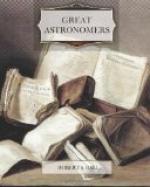An incident which happened in 1692 was apparently the cause of considerable disturbance in Newton’s equanimity, if not in his health. He had gone to early morning chapel, leaving a lighted candle among his papers on his desk. Tradition asserts that his little dog “Diamond” upset the candle; at all events, when Newton came back he found that many valuable papers had perished in a conflagration. The loss of these manuscripts seems to have had a serious effect. Indeed, it has been asserted that the distress reduced Newton to a state of mental aberration for a considerable time. This has, apparently, not been confirmed, but there is no doubt that he experienced considerable disquiet, for in writing on September 13th, 1693, to Mr. Pepys, he says:
“I am extremely troubled at the embroilment I am in, and have neither ate nor slept well this twelvemonth, nor have my former consistency of mind.”
Notwithstanding the fame which Newton had achieved, by the publication of his, “Principia,” and by all his researches, the State had not as yet taken any notice whatever of the most illustrious man of science that this or any other country has ever produced. Many of his friends had exerted themselves to procure him some permanent appointment, but without success. It happened, however, that Mr. Montagu, who had sat with Newton in Parliament, was appointed Chancellor of the Exchequer in 1694. Ambitious of distinction in his new office, Mr. Montagu addressed himself to the improvement of the current coin, which was then in a very debased condition. It fortunately happened that an opportunity occurred of appointing a new official in the Mint; and Mr. Montagu on the 19th of March, 1695, wrote to offer Mr. Newton the position of warden. The salary was to be five or six hundred a year, and the business would not require more attendance than Newton could spare. The Lucasian professor accepted this post, and forthwith entered upon his new duties.
The knowledge of physics which Newton had acquired by his experiments was of much use in connection with his duties at the Mint. He carried out the re-coinage with great skill in the course of two years, and as a reward for his exertions, he was appointed, in 1697, to the Mastership of the Mint, with a salary between 1,200 Pounds and 1,500 Pounds per annum. In 1701, his duties at the Mint being so engrossing, he resigned his Lucasian professorship at Cambridge, and at the same time he had to surrender his fellowship at Trinity College. This closed his connection with the University of Cambridge. It should, however, be remarked that at a somewhat earlier stage in his career he was very nearly being appointed to an office which might have enabled the University to retain the great philosopher within its precincts. Some of his friends had almost succeeded in securing his nomination to the Provostship of King’s College, Cambridge; the appointment, however, fell through, inasmuch as the statute could not be evaded, which required that the Provost of King’s College should be in holy orders.




